Jefferson Airplane
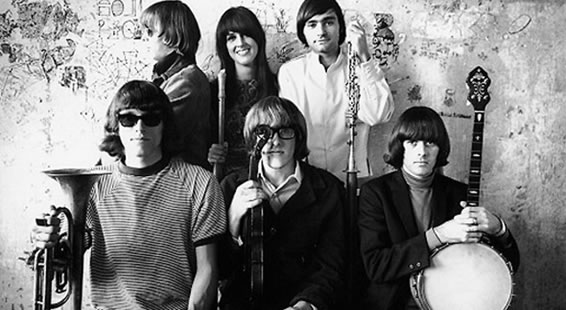 Jefferson Airplane was a rock band based in San Francisco, California, who pioneered psychedelic rock. Formed in 1965, the group defined the San Francisco Sound and was the first from the Bay Area to achieve international commercial success. They were headliners at the three most famous American rock festivals of the 1960s—Monterey (1967), Woodstock (1969) and Altamont (1969)—and the first Isle of Wight Festival (1968) in England. Their 1967 break-out album Surrealistic Pillow ranks on the short list of the most significant recordings of the “Summer of Love”. Two songs from that album, “Somebody to Love” and “White Rabbit”, are among Rolling Stone’s “500 Greatest Songs of All Time.”
Jefferson Airplane was a rock band based in San Francisco, California, who pioneered psychedelic rock. Formed in 1965, the group defined the San Francisco Sound and was the first from the Bay Area to achieve international commercial success. They were headliners at the three most famous American rock festivals of the 1960s—Monterey (1967), Woodstock (1969) and Altamont (1969)—and the first Isle of Wight Festival (1968) in England. Their 1967 break-out album Surrealistic Pillow ranks on the short list of the most significant recordings of the “Summer of Love”. Two songs from that album, “Somebody to Love” and “White Rabbit”, are among Rolling Stone’s “500 Greatest Songs of All Time.”
The “classic” lineup of Jefferson Airplane, from October 1966 to February 1970, was Marty Balin (vocals), Paul Kantner (guitar, vocals), Grace Slick (vocals), Jorma Kaukonen (lead guitar, vocals), Jack Casady (bass), and Spencer Dryden (drums). Marty Balin left the band in 1971. After 1972, Jefferson Airplane effectively split into two groups. Kaukonen and Casady moved on full time to their own band, Hot Tuna. Slick, Kantner, and the remaining members of Jefferson Airplane recruited new members and regrouped as Jefferson Starship in 1974, with Marty Balin eventually joining them. Jefferson Airplane was inducted into the Rock and Roll Hall of Fame in 1996.
Grateful Dead
Grateful Dead was an American rock band formed in 1965 in Palo Alto, California. Ranging from quintet to septet, the band is known for its unique and eclectic style, which fused elements of rock, psychedelia, experimental music, modal jazz, country, folk, bluegrass, blues, reggae, and space rock, for live performances of lengthy instrumental jams, and for their devoted fan base, known as “Deadheads”. “Their music,” writes Lenny Kaye, “touches on ground that most other groups don’t even know exists.” These various influences were distilled into a diverse and psychedelic whole that made the Grateful Dead “the pioneering Godfathers of the jam band world”. The band was ranked 57th by Rolling Stone magazine in its The Greatest Artists of All Time issue. The band was inducted into the Rock and Roll Hall of Fame in 1994 and a recording of their May 8, 1977 performance at Cornell University’s Barton Hall was added to the National Recording Registry of the Library of Congress in 2012. The Grateful Dead have sold more than 35 million albums worldwide.
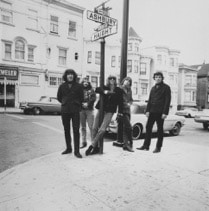 The Grateful Dead was founded in the San Francisco Bay Area amid the rise of the counterculture of the 1960s. The founding members were Jerry Garcia (lead guitar, vocals), Bob Weir (rhythm guitar, vocals), Ron “Pigpen” McKernan (keyboards, harmonica, vocals), Phil Lesh (bass, vocals), and Bill Kreutzmann (drums). Members of the Grateful Dead had played together in various San Francisco bands, including Mother McCree’s Uptown Jug Champions and the Warlocks. Lesh was the last member to join the Warlocks before they became the Grateful Dead; he replaced Dana Morgan Jr., who had played bass for a few gigs. Drummer Mickey Hart and nonperforming lyricist Robert Hunter joined in 1967. With the exception of McKernan, who died in 1973, and Hart, who took time off from 1971 to 1974, the core of the band stayed together for its entire 30-year history. The other official members of the band are Tom Constanten (keyboards; 1968–1970), John Perry Barlow (nonperforming lyricist; 1971–1995), Keith Godchaux (keyboards; 1971–1979), Donna Godchaux (vocals; 1972–1979), Brent Mydland (keyboards, vocals; 1979–1990), and Vince Welnick (keyboards, vocals; 1990–1995). Pianist Bruce Hornsby was a touring member from 1990 to 1992, as well as a guest with the band on occasion before and after the tours.
The Grateful Dead was founded in the San Francisco Bay Area amid the rise of the counterculture of the 1960s. The founding members were Jerry Garcia (lead guitar, vocals), Bob Weir (rhythm guitar, vocals), Ron “Pigpen” McKernan (keyboards, harmonica, vocals), Phil Lesh (bass, vocals), and Bill Kreutzmann (drums). Members of the Grateful Dead had played together in various San Francisco bands, including Mother McCree’s Uptown Jug Champions and the Warlocks. Lesh was the last member to join the Warlocks before they became the Grateful Dead; he replaced Dana Morgan Jr., who had played bass for a few gigs. Drummer Mickey Hart and nonperforming lyricist Robert Hunter joined in 1967. With the exception of McKernan, who died in 1973, and Hart, who took time off from 1971 to 1974, the core of the band stayed together for its entire 30-year history. The other official members of the band are Tom Constanten (keyboards; 1968–1970), John Perry Barlow (nonperforming lyricist; 1971–1995), Keith Godchaux (keyboards; 1971–1979), Donna Godchaux (vocals; 1972–1979), Brent Mydland (keyboards, vocals; 1979–1990), and Vince Welnick (keyboards, vocals; 1990–1995). Pianist Bruce Hornsby was a touring member from 1990 to 1992, as well as a guest with the band on occasion before and after the tours.
After the death of Garcia in 1995, former members of the band, along with other musicians, toured as the Other Ones in 1998, 2000, and 2002, and the Dead in 2003, 2004, and 2009. In 2015, the four surviving core members marked the band’s 50th anniversary in a series of concerts that were billed as their last performances together. There have also been several spin-offs featuring one or more core members, such as Dead & Company, Furthur, the Rhythm Devils, Phil Lesh & Friends, RatDog, and Billy & the Kids.
Big Brother and the Holding Company (featuring Janis Joplin)
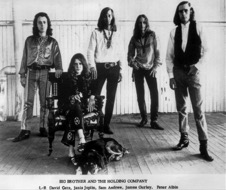 Big Brother and the Holding Company is an American rock band that formed in San Francisco in 1965 as part of the same psychedelic music scene that produced the Grateful Dead, Quicksilver Messenger Service, and Jefferson Airplane. They are best known as the band that featured Janis Joplin as their lead singer. Their 1968 album Cheap Thrills is considered one of the masterpieces of the psychedelic sound of San Francisco; it reached number one on the Billboard charts.
Big Brother and the Holding Company is an American rock band that formed in San Francisco in 1965 as part of the same psychedelic music scene that produced the Grateful Dead, Quicksilver Messenger Service, and Jefferson Airplane. They are best known as the band that featured Janis Joplin as their lead singer. Their 1968 album Cheap Thrills is considered one of the masterpieces of the psychedelic sound of San Francisco; it reached number one on the Billboard charts.
Janis Joplin, was an American rock singer and songwriter. She was one of the biggest female rock stars of her era. After releasing three albums, she died of a heroin overdose at age 27. A fourth album, Pearl, was released in January 1971, just over three months after her death. It reached number one on the Billboard charts.
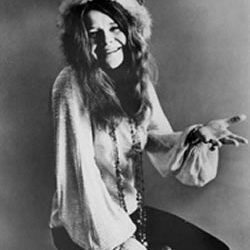 In 1967, Joplin rose to fame during an appearance at Monterey Pop Festival, where she was the lead singer of the then little-known San Francisco psychedelic rock band Big Brother and the Holding Company. After releasing two albums with the band, she left Big Brother to continue as a solo artist with her own backing groups, first the Kozmic Blues Band and then the Full Tilt Boogie Band. She appeared at the Woodstock festival and the Festival Express train tour. Five singles by Joplin went into the Billboard Hot 100, including a cover of the song “Me and Bobby McGee”, which reached number 1 in March 1971. Her most popular songs include her cover versions of “Piece of My Heart”, “Cry Baby”, “Down on Me”, “Ball ‘n’ Chain”, and “Summertime”; and her original song “Mercedes Benz”, her final recording.
In 1967, Joplin rose to fame during an appearance at Monterey Pop Festival, where she was the lead singer of the then little-known San Francisco psychedelic rock band Big Brother and the Holding Company. After releasing two albums with the band, she left Big Brother to continue as a solo artist with her own backing groups, first the Kozmic Blues Band and then the Full Tilt Boogie Band. She appeared at the Woodstock festival and the Festival Express train tour. Five singles by Joplin went into the Billboard Hot 100, including a cover of the song “Me and Bobby McGee”, which reached number 1 in March 1971. Her most popular songs include her cover versions of “Piece of My Heart”, “Cry Baby”, “Down on Me”, “Ball ‘n’ Chain”, and “Summertime”; and her original song “Mercedes Benz”, her final recording.
Joplin, highly respected for her charismatic performing ability, was posthumously inducted into the Rock and Roll Hall of Fame in 1995.
Jimi Hendrix
Jimi Hendrix was an American rock guitarist, singer, and songwriter. Although his mainstream career spanned only four years, he is widely regarded as one of the most influential electric guitarists in the history of popular music, and one of the most celebrated musicians of the 20th century. The Rock and Roll Hall of Fame describes him as “arguably the greatest instrumentalist in the history of rock music”.
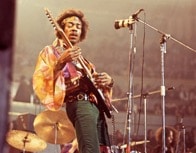 Born in Seattle, Washington, Hendrix began playing guitar at the age of 15. In 1961, he enlisted in the U.S. Army and trained as a paratrooper in the 101st Airborne Division; he was granted an honorable discharge the following year. Soon afterward, he moved to Clarksville, Tennessee, and began playing gigs on the Chitlin’ Circuit, earning a place in the Isley Brothers’ backing band and later with Little Richard, with whom he continued to work through mid-1965. He then played with Curtis Knight and the Squires before moving to England in late 1966 after being discovered by Linda Keith, who in turn interested bassist Chas Chandler of the Animals in becoming his first manager. Within months, Hendrix had earned three UK top ten hits with the Jimi Hendrix Experience: “Hey Joe”, “Purple Haze”, and “The Wind Cries Mary”. He achieved fame in the U.S. after his performance at the Monterey Pop Festival in 1967, and in 1968 his third and final studio album, Electric Ladyland, reached number one in the U.S.; it was Hendrix’s most commercially successful release and his first and only number one album. The world’s highest-paid performer, he headlined the Woodstock Festival in 1969 and the Isle of Wight Festival in 1970 before his accidental death from barbiturate-related asphyxia on September 18, 1970, at the age of 27.
Born in Seattle, Washington, Hendrix began playing guitar at the age of 15. In 1961, he enlisted in the U.S. Army and trained as a paratrooper in the 101st Airborne Division; he was granted an honorable discharge the following year. Soon afterward, he moved to Clarksville, Tennessee, and began playing gigs on the Chitlin’ Circuit, earning a place in the Isley Brothers’ backing band and later with Little Richard, with whom he continued to work through mid-1965. He then played with Curtis Knight and the Squires before moving to England in late 1966 after being discovered by Linda Keith, who in turn interested bassist Chas Chandler of the Animals in becoming his first manager. Within months, Hendrix had earned three UK top ten hits with the Jimi Hendrix Experience: “Hey Joe”, “Purple Haze”, and “The Wind Cries Mary”. He achieved fame in the U.S. after his performance at the Monterey Pop Festival in 1967, and in 1968 his third and final studio album, Electric Ladyland, reached number one in the U.S.; it was Hendrix’s most commercially successful release and his first and only number one album. The world’s highest-paid performer, he headlined the Woodstock Festival in 1969 and the Isle of Wight Festival in 1970 before his accidental death from barbiturate-related asphyxia on September 18, 1970, at the age of 27.
Hendrix was inspired musically by American rock and roll and electric blues. He favored overdriven amplifiers with high volume and gain, and was instrumental in utilizing the previously undesirable sounds caused by guitar amplifier feedback. He helped to popularize the use of a wah-wah pedal in mainstream rock, and was the first artist to use stereophonic phasing effects in music recordings. Holly George-Warren of Rolling Stone commented: “Hendrix pioneered the use of the instrument as an electronic sound source. Players before him had experimented with feedback and distortion, but Hendrix turned those effects and others into a controlled, fluid vocabulary every bit as personal as the blues with which he began.”
Buffalo Springfield
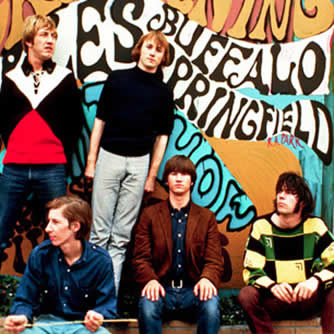 Buffalo Springfield was an American rock band active from 1966 to 1968 containing Stephen Stills, Neil Young, and Richie Furay, which released three albums, and several singles including “For What It’s Worth”. The band combined elements of folk and country music with British invasion and psychedelia influences, and, along with the Byrds, were part of the early development of the folk rock genre.
Buffalo Springfield was an American rock band active from 1966 to 1968 containing Stephen Stills, Neil Young, and Richie Furay, which released three albums, and several singles including “For What It’s Worth”. The band combined elements of folk and country music with British invasion and psychedelia influences, and, along with the Byrds, were part of the early development of the folk rock genre.
With a name taken from a brand of steamroller, Buffalo Springfield formed in Los Angeles in 1966 with Stills (guitar, keyboards, vocals), Dewey Martin (drums, vocals), Bruce Palmer (electric bass), Furay (guitar, vocals), and Young (guitar, harmonica, piano, vocals). The band signed to Atlantic Records in 1966 and released their debut single “Nowadays Clancy Can’t Even Sing” – a regional hit in Los Angeles. The following January, the group released the protest song they were most known for, “For What It’s Worth”. Their second album, Buffalo Springfield Again, marked their progression to psychedelia and hard rock.
After various drug-related arrests and line-up changes, the group broke up in 1968. Stephen Stills went on to form the folk rock supergroup Crosby, Stills & Nash with David Crosby of the Byrds and Graham Nash of the Hollies. Neil Young had launched his successful solo career and reunited with Stills in Crosby, Stills, Nash & Young in 1969. Furay, along with Jim Messina, went on to form the country-rock band Poco. Buffalo Springfield was inducted into the Rock and Roll Hall of Fame in 1997
Moby Grape
Moby Grape is an American rock group from the 1960s, known for having all five members contribute to singing and songwriting and that collectively merged elements of folk music, blues, country, and jazz, together with rock and psychedelic music. They were one of the few groups of which all members were lead vocalists. The group continues to perform occasionally.
1966–1967
 The group was formed in late 1966 in San Francisco, at the instigation of Skip Spence and Matthew Katz. Both had been previously associated with Jefferson Airplane, Spence as the band’s first drummer, playing on their first album, Jefferson Airplane Takes Off, and Katz as the band’s manager, but both had been dismissed by the group. Katz encouraged Spence to form a band similar to Jefferson Airplane, with varied songwriting and vocal work by several group members, and with Katz as the manager. According to band member Peter Lewis, “Matthew (Katz) brought the spirit of conflict into the band. He didn’t want it to be an equal partnership. He wanted it all.”
The group was formed in late 1966 in San Francisco, at the instigation of Skip Spence and Matthew Katz. Both had been previously associated with Jefferson Airplane, Spence as the band’s first drummer, playing on their first album, Jefferson Airplane Takes Off, and Katz as the band’s manager, but both had been dismissed by the group. Katz encouraged Spence to form a band similar to Jefferson Airplane, with varied songwriting and vocal work by several group members, and with Katz as the manager. According to band member Peter Lewis, “Matthew (Katz) brought the spirit of conflict into the band. He didn’t want it to be an equal partnership. He wanted it all.”
The band name, judicially determined to have been chosen by Bob Mosley and Spence, came from the punch line of the joke “What’s purple and swims?”. Lead guitarist Jerry Miller and drummer Don Stevenson (both formerly of The Frantics, originally based in Seattle) joined guitarist (and son of actress Loretta Young) Peter Lewis (of The Cornells), bassist Bob Mosley (of The Misfits, based in San Diego), and Spence, now on guitar instead of drums. Jerry Miller and Don Stevenson had moved The Frantics from Seattle to San Francisco after a 1965 meeting with Jerry Garcia, then playing with The Warlocks at a bar in Belmont, California. Garcia encouraged them to move to San Francisco. Once The Frantics were settled in San Francisco, Mosley joined the band.
While Jerry Miller was the principal lead guitarist, all three guitarists played lead at various points, often playing off against each other, in a guitar form associated with Moby Grape as “crosstalk”. The other major three-guitar band at the time was Buffalo Springfield. Moby Grape’s music has been described by Geoffrey Parr as follows: “No rock and roll group has been able to use a guitar trio as effectively as Moby Grape did on Moby Grape. Spence played a distinctive rhythm guitar that really sticks out throughout the album. Lewis, meanwhile, was a very good guitar player overall and was excellent at finger picking, as is evident in several songs. And then there is Miller, “The way they crafted their parts and played together on Moby Grape is like nothing else I’ve ever heard in my life. The guitars are like a collage of sound that makes perfect sense.”
All band members wrote songs and sang lead and backup vocals for their debut album Moby Grape (1967). Mosley, Lewis, and Spence generally wrote alone, while Miller and Stevenson generally wrote together. In a marketing stunt, Columbia Records immediately released five singles at once, and the band was perceived as being over-hyped. This was during a period in which mainstream record labels were giving previously unheard-of levels of promotion to what was then considered counter-cultural music genres. Nonetheless, the record was critically acclaimed and fairly successful commercially, with The Move covering the album’s “Hey Grandma” (a Miller-Stevenson composition) on their eponymous first album. More recently, “Hey Grandma” was included in the soundtrack to the 2005 Sean Penn-Nicole Kidman film, The Interpreter, as well as being covered in 2009 by the Black Crowes, on Warpaint Live. Spence’s “Omaha” was the only one of the five singles to chart, reaching number 88 in 1967. Miller-Stevenson’s “8:05” became a country rock standard (covered by Robert Plant, Guy Burlage, and others).
One of Moby Grape’s earliest major onstage performances was the Mantra-Rock Dance—a musical event held on January 29, 1967 at the Avalon Ballroom by the San Francisco Hare Krishna temple. At the event Moby Grape performed along with the Hare Krishna founder Bhaktivedanta Swami, Allen Ginsberg, Grateful Dead, and Big Brother and the Holding Company with Janis Joplin, donating proceeds to the temple. The group appeared at the Monterey Pop Festival on Saturday, June 17, 1967.
Iron Butterfly
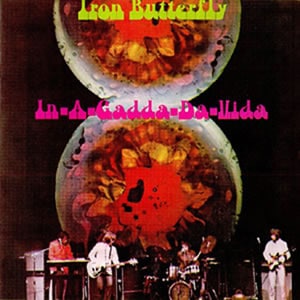 Iron Butterfly is an American rock band best known for the 1968 hit “In-A-Gadda-Da-Vida”, providing a dramatic sound that led the way towards the development of hard rock and heavy metal music.
Iron Butterfly is an American rock band best known for the 1968 hit “In-A-Gadda-Da-Vida”, providing a dramatic sound that led the way towards the development of hard rock and heavy metal music.
Formed in San Diego, California, among band members who used to be “arch enemies”, their heyday was the late 1960s, but the band has been reincarnated with various members with varying levels of success, with no new recordings since 1975.
The band’s seminal 1968 album In-A-Gadda-Da-Vida is among the world’s 40 best-selling albums, selling more than 30 million copies. Iron Butterfly is also notable for being the first group to receive an RIAA platinum award.
Strawberry Alarm Clock
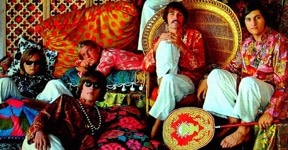 Strawberry Alarm Clock is a psychedelic rock band formed in 1967 in Los Angeles best known for their 1967 hit single “Incense and Peppermints”.
Strawberry Alarm Clock is a psychedelic rock band formed in 1967 in Los Angeles best known for their 1967 hit single “Incense and Peppermints”.
Strawberry Alarm Clock, who have been also categorized as acid rock, psychedelic pop and sunshine pop, charted five songs including two Top 40 hits
Country Joe and the Fish
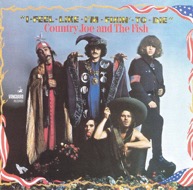 Country Joe and the Fish was an American psychedelic rock band formed in Berkeley, California, in 1965. The band was among the influential groups in the San Francisco music scene during the mid- to late 1960s. Much of the band’s music was written by founding members Country Joe McDonald and Barry “The Fish” Melton, with lyrics pointedly addressing issues of importance to the counterculture, such as anti-war protests, free love, and recreational drug use. Through a combination of psychedelia and electronic music, the band’s sound was marked by innovative guitar melodies and distorted organ-driven instrumentals which were significant to the development of acid rock.
Country Joe and the Fish was an American psychedelic rock band formed in Berkeley, California, in 1965. The band was among the influential groups in the San Francisco music scene during the mid- to late 1960s. Much of the band’s music was written by founding members Country Joe McDonald and Barry “The Fish” Melton, with lyrics pointedly addressing issues of importance to the counterculture, such as anti-war protests, free love, and recreational drug use. Through a combination of psychedelia and electronic music, the band’s sound was marked by innovative guitar melodies and distorted organ-driven instrumentals which were significant to the development of acid rock.
The band self-produced two EPs that drew attention on the underground circuit before signing to Vanguard Records in 1966. Their debut album, Electric Music for the Mind and Body, followed in 1967. It contained their only nationally charting single, “Not So Sweet Martha Lorraine”, and their most experimental arrangements. Their second album, I-Feel-Like-I’m-Fixin’-to-Die, was released in late 1967; its title track, with its dark humor and satire, became their signature tune and is among the era’s most recognizable protest songs. Further success followed, including McDonald’s appearance at Woodstock, but the group’s lineup underwent changes until its disbandment in 1970. Members of the band continue in the music industry as solo recording artists and sporadically reconvene.
Cream
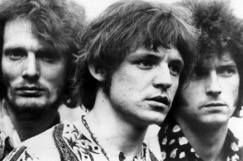 Cream were a 1960s British rock power trio consisting of drummer Ginger Baker, guitarist/singer Eric Clapton and bassist/singer Jack Bruce. The group’s third album, Wheels of Fire (1968), was the world’s first platinum-selling double album. The band is widely regarded as the world’s first successful supergroup. In their career, they sold more than 15 million copies of their albums worldwide. Their music included songs based on traditional blues such as “Crossroads” and “Spoonful”, and modern blues such as “Born Under a Bad Sign”, as well as more current material such as “Strange Brew”, “Tales of Brave Ulysses” and “Toad”.
Cream were a 1960s British rock power trio consisting of drummer Ginger Baker, guitarist/singer Eric Clapton and bassist/singer Jack Bruce. The group’s third album, Wheels of Fire (1968), was the world’s first platinum-selling double album. The band is widely regarded as the world’s first successful supergroup. In their career, they sold more than 15 million copies of their albums worldwide. Their music included songs based on traditional blues such as “Crossroads” and “Spoonful”, and modern blues such as “Born Under a Bad Sign”, as well as more current material such as “Strange Brew”, “Tales of Brave Ulysses” and “Toad”.
The band’s biggest hits were “I Feel Free” (UK number 11), “Sunshine of Your Love” (US number 5), “White Room” (US number 6), “Crossroads” (US number 28), and “Badge” (UK number 18).
The band made a significant impact on the popular music of the time, and, along with Jimi Hendrix and other notable guitarists and bands, popularised the use of the wah-wah pedal. They provided a heavy yet technically proficient musical theme that foreshadowed and influenced the emergence of British bands such as Led Zeppelin, Deep Purple and Black Sabbath in the late 1960s and the early 1970s. They also had an impact on American southern rock groups the Allman Brothers Band and Lynyrd Skynyrd. The band’s live performances influenced progressive rock acts such as Rush.
The band was inducted into the Rock and Roll Hall of Fame in 1993.
Creedence Clearwater Revival
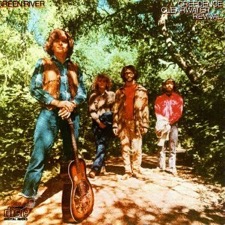 Creedence Clearwater Revival: An American rock band active in the late 1960s and early 1970s.
Creedence Clearwater Revival: An American rock band active in the late 1960s and early 1970s.
The band consisted of lead vocalist, lead guitarist, and primary songwriter John Fogerty, his brother rhythm guitarist Tom Fogerty, bassist Stu Cook and drummer Doug Clifford. Their musical style encompassed the roots rock, swamp rock, and blues rock genres. Despite their San Francisco Bay Area origins, they played in a Southern rock style, with lyrics about bayous, catfish, the Mississippi River, and other popular elements of Southern United States iconography, as well as political and socially-conscious lyrics about topics including the Vietnam War. The band performed at 1969’s famed Woodstock Festival.
After four years of chart-topping success, the group disbanded acrimoniously in late 1972. Tom Fogerty had officially left the previous year, and his brother John was at odds with the remaining members over matters of business and artistic control, all of which resulted in subsequent lawsuits between the former bandmates. Fogerty’s ongoing disagreements with Saul Zaentz, owner of their label Fantasy Records, created further protracted court battles. As a result, John Fogerty refused to perform with the two-other surviving former members at CCR’s 1993 induction into the Rock and Roll Hall of Fame.
Donovan
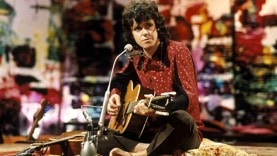 Donovan is a Scottish singer, songwriter and guitarist. He developed an eclectic and distinctive style that blended folk, jazz, pop, psychedelia, and world music (notably calypso). He has lived in Scotland, Hertfordshire (England), London and California, and, since at least 2008, in County Cork, Ireland, with his family. Emerging from the British folk scene, Donovan reached fame in the United Kingdom in early 1965 with live performances on the pop TV series Ready Steady Go!.
Donovan is a Scottish singer, songwriter and guitarist. He developed an eclectic and distinctive style that blended folk, jazz, pop, psychedelia, and world music (notably calypso). He has lived in Scotland, Hertfordshire (England), London and California, and, since at least 2008, in County Cork, Ireland, with his family. Emerging from the British folk scene, Donovan reached fame in the United Kingdom in early 1965 with live performances on the pop TV series Ready Steady Go!.
Having signed with Pye Records in 1965, he recorded singles and two albums in the folk vein, after which he signed to CBS/Epic Records in the US – the first signing by the company’s new vice-president Clive Davis – and became more successful internationally. He began a long and successful collaboration with leading British independent record producer Mickie Most, scoring multiple hit singles and albums in the UK, US, and other countries.
His most successful singles were the early UK hits “Catch the Wind”, “Colours” and “Universal Soldier” in 1965. In September 1966 “Sunshine Superman” topped America’s Billboard Hot 100 chart for one week and went to number two in Britain, followed by “Mellow Yellow” at US No.2 in December 1966, then 1968’s “Hurdy Gurdy Man” in the Top 5 in both countries, then “Atlantis”, which reached US No.7 in May 1969.
He became a friend of pop musicians including Joan Baez, Brian Jones and The Beatles. He taught John Lennon a finger-picking guitar style in 1968 that Lennon employed in “Dear Prudence,” “Julia,” “Happiness Is a Warm Gun” and other songs. Donovan’s commercial fortunes waned after parting with Most in 1969, and he left the industry for a time.
Donovan continued to perform and record sporadically in the 1970s and 1980s. His musical style and hippie image were scorned by critics, especially after punk rock. His performing and recording became sporadic until a revival in the 1990s with the emergence of Britain’s rave scene. He recorded the 1996 album Sutras with producer Rick Rubin and in 2004 made a new album, Beat Cafe. Donovan was inducted into the Rock and Roll Hall of Fame in 2012 and the Songwriters Hall of Fame in 2014.
The Doors
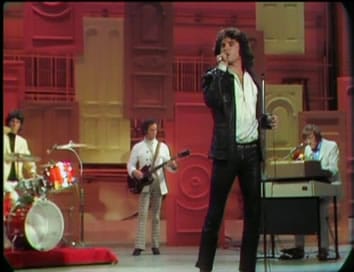 The Doors were an American rock band formed in 1965 in Los Angeles, with vocalist Jim Morrison, keyboardist Ray Manzarek, guitarist Robby Krieger, and drummer John Densmore. The band got its name, at Morrison’s suggestion from the title of Aldous Huxley’s book The Doors of Perception, which itself was a reference to a quote made by William Blake, “If the doors of perception were cleansed, everything would appear to man as it is, infinite.” They were unique and among the most controversial and influential rock acts of the 1960s, mostly because of Morrison’s lyrics and charismatic but unpredictable stage persona. After Morrison’s death in 1971 at age 27, the remaining members continued as a trio until disbanding in 1973.
The Doors were an American rock band formed in 1965 in Los Angeles, with vocalist Jim Morrison, keyboardist Ray Manzarek, guitarist Robby Krieger, and drummer John Densmore. The band got its name, at Morrison’s suggestion from the title of Aldous Huxley’s book The Doors of Perception, which itself was a reference to a quote made by William Blake, “If the doors of perception were cleansed, everything would appear to man as it is, infinite.” They were unique and among the most controversial and influential rock acts of the 1960s, mostly because of Morrison’s lyrics and charismatic but unpredictable stage persona. After Morrison’s death in 1971 at age 27, the remaining members continued as a trio until disbanding in 1973.
Signing with Elektra Records in 1966, the Doors released eight albums between 1967 and 1971. All but one hit the Top 10 on the Billboard 200 and went platinum or better. Their self-titled debut album (1967) was their first in a series of Top 10 albums in the United States, followed by Strange Days (also 1967), Waiting for the Sun (1968), The Soft Parade (1969), Morrison Hotel (1970), Absolutely Live (1970) and L.A. Woman (1971), with 20 Gold, 14 Platinum, 5 Multi-Platinum and 1 Diamond album awards in the United States alone. By the end of 1971, it was reported that the Doors had sold 4,190,457 albums domestically and 7,750,642 singles. The band had three million-selling singles in the U.S. with “Light My Fire”, “Hello, I Love You” and “Touch Me”. After Morrison’s death in 1971, the surviving trio released two albums Other Voices and Full Circle with Manzarek and Krieger sharing lead vocals. The three members also collaborated on the spoken word recording of Morrison’s An American Prayer in 1978 and on the “Orange County Suite” for a 1997 boxed set. Manzarek, Krieger and Densmore reunited in 2000 for an episode of VH1’s “Storytellers” and subsequently recorded Stoned Immaculate: The Music of The Doors with a variety of vocalists.
Although the Doors’ active career ended in 1973, their popularity has persisted. According to the RIAA, they have sold 33 million certified units in the US and over 100 million records worldwide, making them one of the best-selling bands of all time. The Doors have been listed as one of the greatest artists of all time by many magazines, including Rolling Stone, which ranked them 41st on its list of the “100 Greatest Artists of All Time”. The Doors were the first American band to accumulate eight consecutive gold and platinum LP’s.
Crosby, Stills, and Nash (Young)
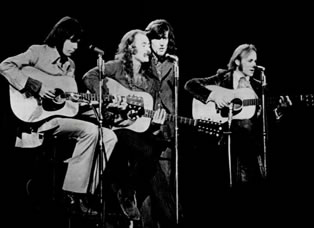 Crosby, Stills, and Nash was a folk rock supergroup made up of American singer-songwriters David Crosby and Stephen Stills and English singer-songwriter Graham Nash. They were known as Crosby, Stills, Nash & Young (CSNY) when joined by Canadian singer-songwriter Neil Young, who was an occasional fourth member.
Crosby, Stills, and Nash was a folk rock supergroup made up of American singer-songwriters David Crosby and Stephen Stills and English singer-songwriter Graham Nash. They were known as Crosby, Stills, Nash & Young (CSNY) when joined by Canadian singer-songwriter Neil Young, who was an occasional fourth member.
They were noted for their intricate vocal harmonies, often tumultuous interpersonal relationships, political activism, and lasting influence on US music and culture. Crosby, Stills & Nash were inducted into the Rock and Roll Hall of Fame and all three members were also inducted for their work in other groups (Crosby for the Byrds, Stills for Buffalo Springfield and Nash for the Hollies). Neil Young has also been inducted as a solo artist and as a member of Buffalo Springfield.
Phil Ochs
 Phil Ochs was an American protest singer (or, as he preferred, a topical singer) and songwriter who was known for his sharp wit, sardonic humor, earnest humanism, political activism, insightful and alliterative lyrics, and distinctive voice. He wrote hundreds of songs in the 1960s and 1970s and released eight albums.
Phil Ochs was an American protest singer (or, as he preferred, a topical singer) and songwriter who was known for his sharp wit, sardonic humor, earnest humanism, political activism, insightful and alliterative lyrics, and distinctive voice. He wrote hundreds of songs in the 1960s and 1970s and released eight albums.
Ochs performed at many political events during the 1960s counterculture era, including anti-Vietnam War and civil rights rallies, student events, and organized labor events over the course of his career, in addition to many concert appearances at such venues as New York City’s Town Hall and Carnegie Hall. Politically, Ochs described himself as a “left social democrat” who became an “early revolutionary” after the protests at the 1968 Democratic National Convention in Chicago led to a police riot, which had a profound effect on his state of mind.
After years of prolific writing in the 1960s, Ochs’s mental stability declined in the 1970s. He eventually succumbed to a number of problems including bipolar disorder and alcoholism, and committed suicide in 1976.
Some of Ochs’s major musical influences were Woody Guthrie, Pete Seeger, Buddy Holly, Elvis Presley, Bob Gibson, Faron Young, and Merle Haggard. His best-known songs include “I Ain’t Marching Anymore”, “Changes”, “Crucifixion”, “Draft Dodger Rag”, “Love Me, I’m a Liberal”, “Outside of a Small Circle of Friends”, “Power and the Glory”, “There but for Fortune”, and “The War Is Over
Procol Harum
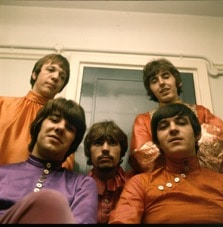 Procol Harum: An English rock band formed in 1967. They contributed to the development of symphonic rock, and by extension, progressive rock.
Procol Harum: An English rock band formed in 1967. They contributed to the development of symphonic rock, and by extension, progressive rock.
Their best-known recording is their 1967 hit single “A Whiter Shade of Pale”, considered a classic in popular music and one of the few singles to have sold over 10 million copies.Although noted for their baroque and classical influence, Procol Harum’s music also embraces the blues, R&B, and soul.
